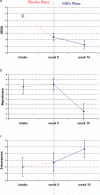Personality change during depression treatment: a placebo-controlled trial
- PMID: 19996037
- PMCID: PMC2799251
- DOI: 10.1001/archgenpsychiatry.2009.166
Personality change during depression treatment: a placebo-controlled trial
Abstract
Context: High neuroticism is a personality risk factor that reflects much of the genetic vulnerability to major depressive disorder (MDD), and low extraversion may increase risk as well. Both have been linked to the serotonin system.
Objectives: To test whether patients with MDD taking selective serotonin reuptake inhibitors (SSRIs) report greater changes in neuroticism and extraversion than patients receiving inert placebo, and to examine the state effect hypothesis that self-reported personality change during SSRI treatment is merely a change of depression-related measurement bias.
Design: A placebo-controlled trial.
Setting: Research clinics. Patients Adult patients with moderate to severe MDD randomized to receive paroxetine (n = 120), placebo (n = 60), or cognitive therapy (n = 60).
Outcome measures: NEO Five-Factor Inventory and Hamilton Rating Scale for Depression.
Results: Patients who took paroxetine reported greater personality change than placebo patients, even after controlling for depression improvement (neuroticism, P < .001; extraversion, P = .002). The advantage of paroxetine over placebo in antidepressant efficacy was no longer significant after controlling for change in neuroticism (P = .46) or extraversion (P = .14). Patients taking paroxetine reported 6.8 times as much change on neuroticism and 3.5 times as much change on extraversion as placebo patients matched for depression improvement. Although placebo patients exhibited substantial depression improvement (Hamilton Rating Scale for Depression score, -1.2 SD, P < .001), they reported little change on neuroticism (-0.18 SD, P = .08) or extraversion (0.08 SD, P = .50). Cognitive therapy produced greater personality change than placebo (P </= .01); but its advantage on neuroticism was no longer significant after controlling for depression (P = .14). Neuroticism reduction during treatment predicted lower relapse rates among paroxetine responders (P = .003) but not among cognitive therapy responders (P = .86).
Conclusions: Paroxetine appears to have a specific pharmacological effect on personality that is distinct from its effect on depression. If replicated, this pattern would disconfirm the state effect hypothesis and instead support the notion that SSRIs' effects on personality go beyond and perhaps contribute to their antidepressant effects.
Figures



Similar articles
-
Neuroticism as a mediator of treatment response to SSRIs in major depressive disorder.J Affect Disord. 2008 Nov;111(1):67-73. doi: 10.1016/j.jad.2008.02.006. Epub 2008 Apr 2. J Affect Disord. 2008. PMID: 18384882 Clinical Trial.
-
Effect of chronic escitalopram versus placebo on personality traits in healthy first-degree relatives of patients with depression: a randomized trial.PLoS One. 2012;7(2):e31980. doi: 10.1371/journal.pone.0031980. Epub 2012 Feb 29. PLoS One. 2012. PMID: 22393376 Free PMC article. Clinical Trial.
-
The effect of selective serotonin reuptake inhibitors in healthy first-degree relatives of patients with major depressive disorder - an experimental medicine blinded controlled trial.Dan Med J. 2012 Apr;59(4):B4426. Dan Med J. 2012. PMID: 22459724 Clinical Trial.
-
[Use of antidepressant drugs in schizophrenic patients with depression].Encephale. 2006 Mar-Apr;32(2 Pt 1):263-9. doi: 10.1016/s0013-7006(06)76153-x. Encephale. 2006. PMID: 16910628 Review. French.
-
Spotlight on paroxetine in psychiatric disorders in adults.CNS Drugs. 2002;16(6):425-34. doi: 10.2165/00023210-200216060-00006. CNS Drugs. 2002. PMID: 12027788 Review.
Cited by
-
Relationship of neuroticism and laboratory pain in healthy children: does anxiety sensitivity play a role?Pain. 2013 Jan;154(1):103-109. doi: 10.1016/j.pain.2012.09.013. Epub 2012 Sep 29. Pain. 2013. PMID: 23158759 Free PMC article.
-
Is low positive emotionality a specific risk factor for depression? A meta-analysis of longitudinal studies.Psychol Bull. 2016 Sep;142(9):991-1015. doi: 10.1037/bul0000059. Epub 2016 Jul 14. Psychol Bull. 2016. PMID: 27416140 Free PMC article.
-
Personality and Alzheimer's disease: An integrative review.Personal Disord. 2019 Jan;10(1):4-12. doi: 10.1037/per0000268. Personal Disord. 2019. PMID: 30604979 Free PMC article. Review.
-
Behavioural and physiological responses of birds to environmentally relevant concentrations of an antidepressant.Philos Trans R Soc Lond B Biol Sci. 2014 Nov 19;369(1656):20130575. doi: 10.1098/rstb.2013.0575. Philos Trans R Soc Lond B Biol Sci. 2014. PMID: 25405964 Free PMC article.
-
Effect of a smartphone-based physical intervention on depression, fitness factors and movement characteristics in adults.BMC Public Health. 2024 Sep 27;24(1):2597. doi: 10.1186/s12889-024-20088-6. BMC Public Health. 2024. PMID: 39334051 Free PMC article.
References
-
- Digman JM. Personality structure: Emergence of the five-factor model. Annu Rev Psychol. 1990;41:417–440.
-
- McCrae RR, Costa PT. Personality trait structure as a human universal. Am Psychol. 1997;52(5):509–516. - PubMed
-
- Costa PT, McCrae RR. Revised NEO Personality Inventory and NEO Five-Factor Inventory: Professional Manual. Psychological Assessment Resources, Inc.; Lutz, Florida: 1992.
-
- McCrae RR, Costa PT. A contemplated revision of the NEO Five-Factor Inventory. Personality and Individual Differences. 2004;36:587–596.
-
- Clark LA, Watson D, Mineka S. Temperament, personality, and the mood and anxiety disorders. J Abnorm Psychol. 1994 Feb;103(1):103–116. - PubMed
Publication types
MeSH terms
Substances
Grants and funding
LinkOut - more resources
Full Text Sources
Other Literature Sources

